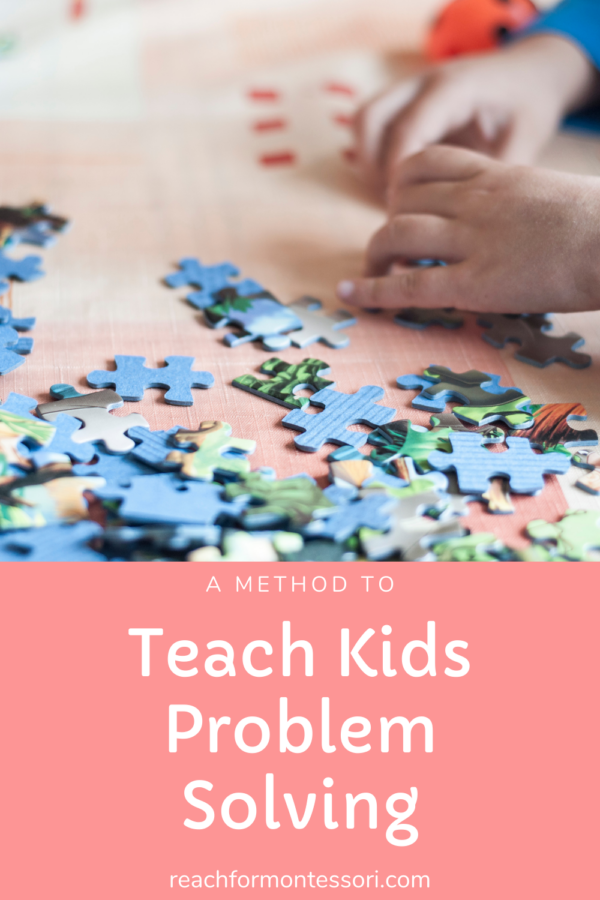How does Montessori promote problem solving skills for kids?
Problem solving is an essential skill that we all need for a successful life. We use problem solving daily at home and at work. Unfortunately, problem solving is something many kids (and adults!) struggle with. In this post, we’ll discuss how problem solving skills for kids are encouraged in a Montessori environment.

Allow the Child to Problem-Solve Independently
A common misconception is that it is the job of a good teacher or a good parent to solve problems for children. While well-intended, too much helping can actually be detrimental to a child’s development, particularly in the area of problem solving.
Dr. Montessori herself realized the dangers of making children too dependent on their caregivers:
“The child who has never learned to work by himself, to set goals for his own acts, or to be the master of his own force of will is recognizable in the adult who lets others guide his will and feels a constant need for approval of others.” — Dr. Maria Montessori, Education and Peace
There is a subtle but important distinction between guiding a little one to the solution to a problem and solving the problem for the child.

Label the Problem
The first step in guiding a child to solve a problem independently is to help him or her identify exactly what the problem is. We do this by asking the child to name or label the problem. If the child is struggling to find the words, then the parent or teacher can provide those words, which empowers the child to properly identify the issue.
You can start by stating your observation of the problem, followed by a clarifying question. If a child is struggling with a puzzle, for instance, you could say, “You’re having trouble fitting that piece, is that right?”
This prompts the child to name the problem while still giving him or her the freedom to come to the conclusion independently.

Ask Questions
Mainstream models of teaching and parenting would have you believe that it’s the child’s role to ask the questions and a parent’s –or teacher’s— job to answer them. In Montessori, though, the opposite is more often the case.
When helping a child arrive at a solution to a problem, it’s usually helpful for the adult to prompt the child by asking some open-ended questions. This can assist the youngster in brainstorming possible strategies for resolving an issue successfully.
Going back to the puzzle example, you could prompt the child by asking questions such as, “Is there another way you could turn the piece?” or “What other pieces are there that match the colors in this piece?”.
This is much more effective that showing the child where the puzzle piece fits because it demonstrates the problem solving skills they’ll need for the next puzzle, activity, or problem.

Set the Child Up for Success
As with all things Montessori, encouraging effective problem solving for children involves preparing the environment. Here, it’s important to provide Montessori toys and activities that are developmentally appropriate but still provide a bit of a challenge.
The key is to present the youngster with a challenge that is just within reach. This “sweet spot,” if you will, encourages growth while not overly frustrating the child.
Of course, this will require a lot of observation on your part as the caregiver as you decide on the level of difficulty that is appropriate.
Wait, Then Wait Some More
Silence can be awkward, and as a society, we tend to detest waiting (I know I do!). If we are to impart problem solving skills to our children, though, we need to learn to be patient ourselves.
Next time you are tempted to “fix” something for your little one, make the conscious decision to stand back and wait instead. More often than not, your child will surprise you by finding a way to solve the problem, often an ingenious way you may have not even thought of yourself. This will be your reward for slowing down and practicing patience.
If you’re not already convinced of the power of waiting without interference, consider Montessori’s own words:
“The fundamental help in development, especially with little children of 3 years of age, is not to interfere. Interference stops activity and stops concentration.” —Dr. Maria Montessori, The Child, Society and the World (Unpublished Speeches and Writing)

Benefits of Teaching Young Children Problem Solving Skills
Teaching problem-solving to little ones may sound straight-forward, but in practice, it requires a good deal of patience and perseverance on the part of the teacher or parent. That’s because it can be a lot easier to solve children’s problems for them in the moment, especially if you’re busy or stressed.
We can all relate!
When you’re feeling tempted to do things for your child rather than take the time to guide them to their own solution, gently remind yourself of the many benefits you’re providing your little one by prompting them to resolve their own problems.
Greater Self-Confidence
Each time a youngster is able to solve a new problem independently, they grow their self-confidence. Over time, this confidence provides them with the ability to tackle problems of ever-increasing difficulty with a sense of calm assurance.
Just think of what the children in your care will be able to accomplish once they know they can do hard things! There’s really no replacement for this sense of capability and confidence.

More Skills
Unfortunately, children who are deprived of opportunities to solve problems independently are robbed of important skills. Montessori herself described this scenario best:
“… the child’s individual liberty must be so guided that through his activity he may arrive at independence … the child who does not do, does not know how to do.” —Dr. Maria Montessori, The Montessori Method
On the other hand, when we afford children the opportunities necessary to learn problem solving skills, they learn these and much, much more. In essence, they become the highly capable children (and eventually adults!) that they were meant to be. Isn’t that what we all want for our kids?
Teaching problem solving skills to our little ones can be tough. The rewards are well worth it, though!
As your child grows in confidence and independence, he or she will naturally exude more joy. You’ll still have moments of frustration, of course.
That’s just par for the course, but you’ll also have moments where you find yourself in absolute awe of the highly capable little person your child is becoming. That’s an accomplishment you can both be proud of!
What does problem-solving look like in your home or classroom?
Cheers and don't forget to subscribe!
